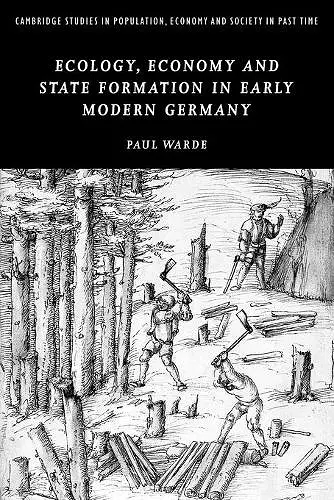Ecology, Economy and State Formation in Early Modern Germany
Format:Paperback
Publisher:Cambridge University Press
Published:10th Jun '10
Currently unavailable, and unfortunately no date known when it will be back
This paperback is available in another edition too:
- Hardback£109.00(9780521831925)

Original case study of how a peasant society in early modern Europe sustained its economy.
This is an original case study of how a peasant society in early modern Europe sustained its economy, which relied on natural resources. It offers a study of south-west Germany's dependence on wood, demonstrating the stability of the economy and social structure through periods of demographic pressure, warfare and epidemic.This is an innovative analysis of the agrarian world and growth of government in early modern Germany through the medium of pre-industrial society's most basic material resource, wood. Paul Warde offers a regional study of south-west Germany from the late fifteenth to the early eighteenth century, demonstrating the stability of the economy and social structure through periods of demographic pressure, warfare and epidemic. He casts light on the nature of 'wood shortages' and societal response to environmental challenge, and shows how institutional responses largely based on preventing local conflict were poor at adapting to optimise the management of resources. Warde further argues for the inadequacy of models that oppose the 'market' to a 'natural economy' in understanding economic behaviour. This is a major contribution to debates about the sustainability of peasant society in early modern Europe, and to the growth of ecological approaches to history and historical geography.
"the implications of Warde's conclusions for how we think about peasant economic activity, for the nature of rhetoric emplyed in disputes within the village commune, and for the interaction of the center and localities in the formation of the early modern territorial state in Europe are ample rewards for the perseverance of the nonspecialist reader." - Geoffrey Dipple, Augustana College
"...this book represents an important effort to re-evaluate the relationship between human beings and their material environment." -Christopher W. Close, H-German
"...impressively researched..." -Christopher W. Close, H-German
"...well thought out piece of research based on the vast literature on the Black Forest and the Duchy of Wurttemberg, and on a thorough investigation of manuscript sources housed in Stuttgart and local record offices." Mauro Ambrosoli, American Historical Review
ISBN: 9780521143332
Dimensions: 229mm x 152mm x 23mm
Weight: 880g
412 pages